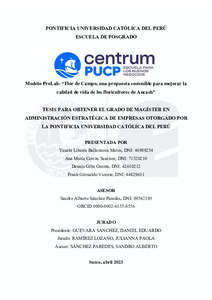| dc.contributor.advisor | Sanchez Paredes, Sandro Alberto | |
| dc.contributor.author | Ballesteros Matos, Yaneht Liboria | |
| dc.contributor.author | Cerrón Sanchez, Ana María | |
| dc.contributor.author | Gibu Guerra, Dennis | |
| dc.contributor.author | Grimaldo Vicente, Frank | |
| dc.date.accessioned | 2023-04-24T21:28:03Z | |
| dc.date.available | 2023-04-24T21:28:03Z | |
| dc.date.created | 2023 | |
| dc.date.issued | 2023-04-24 | |
| dc.identifier.uri | http://hdl.handle.net/20.500.12404/24796 | |
| dc.description.abstract | El negocio de las flores es una actividad sacrificada, pues demanda de mucha paciencia y
tiempo para lograr ver que las producciones de flores den sus frutos. Así mismo, se sabe que
existen muchos intermediarios en esta actividad económica y eso afecta directamente a los
floricultores, pues no logran una retribución económica acorde a su esfuerzo, lo que no genera
sostenibilidad al negocio, siendo muchas veces abandonados por ellos. El problema radica en
que no logran llegar al consumidor final, ya que no cuentan con la capacidad logística, visión
estratégica e igualdad de oportunidades para alcanzar mercados en las principales ciudades del
país.
Para esta problemática identificada, Flor de Campo trabajará de la mano con el floricultor
y brindará el camino para llegar al cliente final de las principales ciudades del país, a través de su
plataforma web, que logrará conectar a los clientes finales al realizar sus pedidos, generando
mayor rentabilidad a sus productos y brindando un mejor precio sin intermediarios, así como
también, lograr minimizar sus pérdidas al ofrecer una alternativa de uso de sus mermas, ya que
se producirá productos derivados de las flores, generando economía circular.
En el proceso para encontrar la solución que logre satisfacer al usuario y al cliente, se
utilizó diversas metodologías agiles e hipótesis para identificar y comprender el problema de los
usuarios, y a partir de ello, elaborar una propuesta de solución y validar la deseabilidad y
factibilidad del negocio para posteriormente implementar la idea de solución. Asimismo, se ha
orientado y alineado con las ODS 1,8 y 10, tomando en cuenta la problemática social alineada al
negocio tomando en cuenta el impacto social deseado.
Por último, se validó la viabilidad del plan de negocio donde se obtuvo un VAN
económico de 4,422,899 soles con una TIR de 338%, generando un VAN social de 25,995,365
soles, haciendo del negocio una propuesta viable y sostenible para los inversionistas. | es_ES |
| dc.description.abstract | Flower business trading is a hard and demanding economic activity due to the patience
and time to analyze that floral productions give their results. It is known that there are many
intermediaries in this market, and it directly affects to the flower growers because they do not
obtain an economic retribution according to their work, which does not generate sustainability to
the business and in numerous times abandoned by them. The problem involves the fact that they
do not manage to reach their final consumer, since they do not have the logistic capacity,
strategic vision and equal opportunities to reach the markets of the main cities of the country.
For this identified problem, Flor de Campo will work directly with the flower grower and
provide the opportunity to reach the final customer in the main cities of the country through its
website. This digital portal will connect final customers to place their orders, generating greater
profitability to their products and providing a better price without intermediaries, furthermore it
will be minimizing their losses by offering an alternative use of their waste, as it will produce
products derived from flowers, generating a circular economy.
In the process of working a solution that satisfies the user and the client, numerous agile
methodologies and hypotheses have been used to identify and understand the user's problem and
in consequence it develops a solution proposal and validates the convenience and viability of the
business that subsequently implements the solution idea. Likewise, it has been oriented and
aligned with SDGs 1,8 and 10, taking social issues into consideration aligned to the business
desired social impact.
Finally, the feasibility of the business plan was validated where an economic NPV of
4,422,899 soles was obtained with an IRR of 338%, generating a social NPV of 25,995,365
soles, making the business a viable and sustainable proposal for investors. | es_ES |
| dc.language.iso | spa | es_ES |
| dc.publisher | Pontificia Universidad Católica del Perú | es_ES |
| dc.rights | info:eu-repo/semantics/openAccess | es_ES |
| dc.rights.uri | http://creativecommons.org/licenses/by-nc-nd/2.5/pe/ | * |
| dc.subject | Negocios--Planificación | es_ES |
| dc.subject | Flores--Industria y comercio | es_ES |
| dc.subject | Floricultura--Perú | es_ES |
| dc.title | Modelo prolab: “Flor de Campo, una propuesta sostenible para mejorar la calidad de vida de los floricultores de Ancash” | es_ES |
| dc.type | info:eu-repo/semantics/masterThesis | es_ES |
| thesis.degree.name | Maestro en Administración Estratégica de Empresas | es_ES |
| thesis.degree.level | Maestría | es_ES |
| thesis.degree.grantor | Pontificia Universidad Católica del Perú. CENTRUM | es_ES |
| thesis.degree.discipline | Administración Estratégica de Empresas | es_ES |
| renati.advisor.dni | 09542193 | |
| renati.advisor.orcid | https://orcid.org/0000-0002-6155-8556 | es_ES |
| renati.author.dni | 46989254 | |
| renati.author.dni | 71520210 | |
| renati.author.dni | 42610212 | |
| renati.author.dni | 44829631 | |
| renati.discipline | 413307 | es_ES |
| renati.juror | Daniel Eduardo Guevara Sanchez | es_ES |
| renati.juror | Julianna Paola Ramirez Lozano | es_ES |
| renati.juror | Sandro Alberto Sanchez Paredes | es_ES |
| renati.level | https://purl.org/pe-repo/renati/level#maestro | es_ES |
| renati.type | https://purl.org/pe-repo/renati/type#tesis | es_ES |
| dc.publisher.country | PE | es_ES |
| dc.subject.ocde | https://purl.org/pe-repo/ocde/ford#5.02.04 | es_ES |







